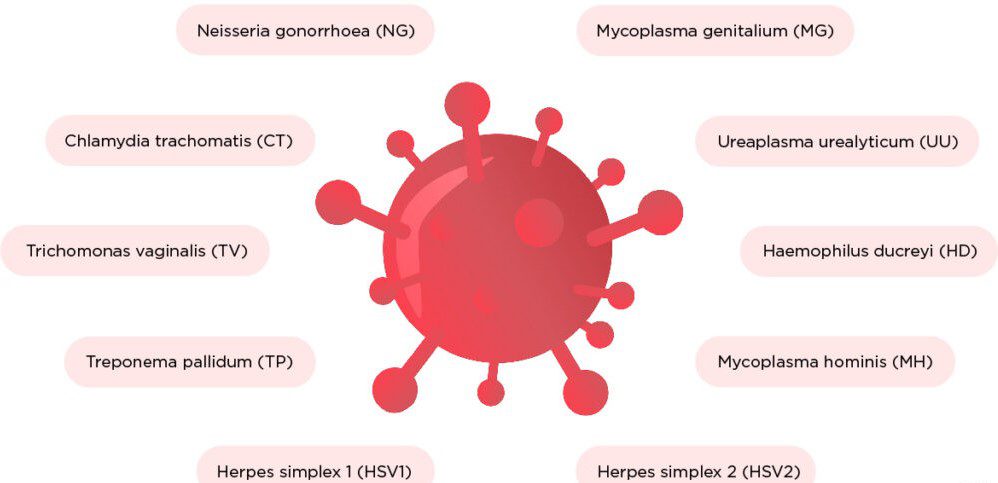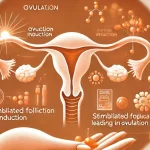If you're reading this, chances are you're expecting a little one or are in the exciting early stages of a pregnancy. Such a period brings a lot of questions, doesn't it? A topic that is not always openly discussed, but is oh-so important, concerns STDs during pregnancy. Maybe not the first thing you think of, but we can assure you that it is essential to be well informed about this. Don't worry, we are here to break the taboo and provide you with all the important information.
In this article we are going to tell you everything you need to know about STDs (Sexually Transmitted Diseases) if you are pregnant or trying to become pregnant. We understand that this may be a bit sensitive or even uncomfortable. But rest assured, here at Midwives Lelystad, no question is too crazy or subject too taboo. Our mission is to guide you through this beautiful, but sometimes complex time with all the information and support you need.
STDs during pregnancy: What are the risks?
Having a Sexually Transmitted Disease (STD) during pregnancy can pose serious risks, both for the expectant mother and for the unborn baby. Understanding what these risks may be is crucial for safeguarding both your health and that of your child. Chlamydia, Gonorrhea, HIV and Herpes are examples of STDs that can pose specific risks during pregnancy, such as premature birth, transmission from mother to child and even miscarriages.
Prevention and treatment are at the heart of managing STDs during this important period. Below is an overview of the actions that can be taken:
-
- Screening for STDs during prenatal care is essential. This ensures that any infections can be detected and treated early.
-
- Using condoms during pregnancy can prevent the transmission of STDs, even in committed relationships where people think they are safe.
It is also important to be open about your sexual history with your healthcare provider. An honest and open conversation can help determine your risk for STDs and the best way to reduce these risks.
How do you prevent STDs if you are pregnant or want to become pregnant?
When you are pregnant or planning to become pregnant, it is essential to pay extra attention to your sexual health. Preventing STDs (Sexually Transmitted Diseases) is crucial, not only for your own well-being, but also for the health of your future baby. One of the most important measures you can take is to ensure open communication with your partner about your sexual health. This includes discussing recent STD tests and, if applicable, informing each other of any infections . Protected sex is another fundamental step. Use consistently condoms with any sexual act, even if you use other forms of contraception. After all, condoms are the only method of contraception that can prevent both pregnancy and the transmission of STDs.
In addition, it is wise to to be tested regularly for STDs, especially if you want to become pregnant. This not only helps in the early detection and treatment of any conditions, but also reduces the risk of transmission from mother to child during pregnancy or childbirth. See the table below for an overview of recommended testing times and types.
| Reason for test | Recommended Test | Comments |
|---|---|---|
| Before pregnancy | Complete STD screening | Including HIV, syphilis, chlamydia and gonorrhea |
| During the pregnancy | HIV, syphilis, hepatitis B | Repeat in 3rd trimester if high risk |
| With risky sexual behavior | Repeat of complete screening | Especially important with new or multiple partners |
Following these steps can go a long way in reducing your risk of STDs, so you can expect a healthier pregnancy and a healthier baby. Remember, at Midwives Lelystad we are ready to support you with advice and care, so don't hesitate to contact us for more information or help planning your pregnancy.
What tests are available for pregnant women
During pregnancy, it is important to pay close attention to your health and that of your baby. That is why there are various tests available that are specifically aimed at detecting sexually transmitted diseases (STDs) in pregnant women. These tests are offered because certain STDs can have serious consequences for both the mother and the unborn baby. This way you can be treated early and minimize the risks.
The tests available for pregnant women include:
-
- HIV test: An essential screening for the Human Immunodeficiency Virus, which can affect both your health and that of your baby. If the result is positive, treatment can be started immediately.
-
- Chlamydia and Gonorrhea test: These bacterial infections can be transmitted to the baby during delivery and may lead to complications. Fortunately, they can be easily treated with antibiotics.
-
- Hepatitis B and C test: These screenings are crucial because the virus can be transmitted from mother to child during childbirth. Vaccinations and treatments can then be administered in a timely manner.
-
- Syphilis test: This is another bacterial infection that can have serious consequences for both the mother and the baby, but fortunately is treatable with antibiotics when detected early.
It is essential that you discuss undergoing these tests on your first visit to the obstetrician or gynecologist. Early detection is essential for the health and well-being of both mother and baby. At Midwives Lelystad, we as experienced professionals are ready to guide you through this process, with respect and understanding for your concerns and wishes.
Treatment of STDs during pregnancy: Safety first
If you have an STD during your pregnancy, it is crucial to treat it as soon as possible. The good news is that many STD treatments are safe during pregnancy, but the most important thing is that the treatment is tailored to both the health of the mother and the unborn child. Chlamydia, gonorrhea,and syphilis for example, can be effectively treated with certain antibiotics that are considered safe during pregnancy. It is essential to be open and honest with your healthcare provider about any symptoms or risks so that they can prescribe safe and effective treatment.
-
- Always use medication as prescribed by your healthcare professional and never interrupt a course of treatment without consultation.
-
- Arrange regular follow-up appointments to ensure the infection has completely cleared and there are no longer any health risks to you or your baby.
Safety comes first, so it is important that you take the necessary precautions to prevent further transmission of STDs. If your partner(s) are also at risk, it is important that they are tested and, if necessary, treated to prevent reinfection. Having an open conversation about STDs can be difficult, but remember that your health and that of your baby comes first.
| Disease | Safe Treatment Options | Comments |
|---|---|---|
| Chlamydia | Antibiotics (Azithromycin) | Single dose may be sufficient |
| Gonorrhea | Antibiotics (Ceftriaxone) | Combination therapy may be necessary |
| Syphilis | Penicillin | Most effective treatment |
Thanks to early detection and treatment, most STDs can be successfully treated during pregnancy, preventing serious consequences for both mother and child. Working together with your healthcare provider is the key to a healthy pregnancy.
Tips for a healthy pregnancy free of STDs
A healthy pregnancy is the goal of every expectant mother and staying free from Sexually Transmitted Diseases (STDs) plays an important role in this. STDs can not only affect the health of the mother, but can also have serious consequences for the health of the baby. That is why it is essential to pay close attention to your health and take the necessary precautions during this important phase. Here are a few tips to keep your pregnancy STD-free:
-
- Regular checks: Make sure you have regular check-ups with your obstetrician or gynecologist. Ask about STD testing as part of your routine health screenings. Early detection of STDs can help prevent transmission to the baby.
-
- Open communication: Have open and honest conversations with your partner about STDs. It is important that both partners are tested and, if necessary, receive treatment to prevent transmission during pregnancy.
-
- Safe sex: If you are not in a monogamous relationship, use condoms during sexual activity to protect yourself against STDs. This is an effective way to minimize the risks of transmissible infections.
In addition, it is important to be aware of the symptoms of STDs, such as unusual discharge, itching, pain during urination, or sores in the genital area. When noticing such symptoms, it is crucial to seek immediate medical attention. Remember, a healthy pregnancy starts with good self-care and prevention. By following the steps above, you increase the chance of a safe and healthy pregnancy, free of STDs.
Resume
We hope that this article has given you more insight into the topic of STDs and pregnancy. Knowledge is power, especially when it concerns the health of you and your future little one. At Midwives Lelystad we understand that with the joy of a pregnancy can also come many questions and concerns. Our team is always ready to answer these questions and provide you with the support you need during this special period.
Remember: it is very normal to be concerned about your health during pregnancy. Get tested regularly for STDs, talk openly with your partner and make sure you stay well informed. If you have any concerns or are experiencing symptoms, please do not hesitate to contact us. We offer a listening ear and professional advice, so that you can continue to enjoy your pregnancy with peace of mind.
Stay alert, be honest with yourself and your healthcare providers and take good care of each other. For more questions, information or to make an appointment, visit our website or contact us directly. At Midwives Lelystad we are committed to your health and that of your baby. Together we ensure a pure and healthy beginning.








